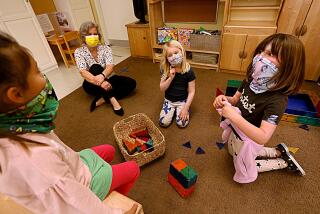Big Payoff for Kids and Society
- Share via
A new Rand study finds that money spent to give disadvantaged children a good start results in greatly reduced government costs later for remedial education, welfare and incarceration.
While this conclusion may seem so obvious that it should need no confirmation from Rand’s rigorous analyses, the study does provide cause for reflection on public policy directions. That’s particularly useful as federal and state lawmakers, including some in California, seek to punish juveniles with tougher sentences and at younger ages.
The Rand study looked at published data from nine programs across the country. Collectively, they provide a wide range of services delivered in a variety of settings. Some targeted low-birth-weight babies, others children in poor neighborhoods. One-on-one parenting help in the home was yet another avenue, along with health screening, social services and traditional preschools.
In every program, the goal was to head off parenting problems or learning difficulties before they began and to give young families resources and help--a support system--they would not otherwise have.
The approach seems to work. The Rand analysts compared long-term developmental indicators from children in these programs with those in control groups; kids were followed into adolescence and sometimes beyond. Almost every measurement--educational achievement, employment, income and signs of mental and physical health--was better for youngsters in the programs. Notably, their involvement in crime and delinquency and participation in the welfare system were lower.
Rand cautions that many of the programs evaluated were small and that much remains unknown about the effects of early childhood intervention. Still, the message is clear: The benefits to government and society of comprehensive health care, parent training and preschool education are measurable and far cheaper to provide than trying to rehabilitate young people who have gone astray.
For lawmakers considering proposals for universal preschool and expanded efforts directed toward infants and other youngsters, the Rand findings affirm that an ounce of intervention can obviate tons of costly cures later on.
More to Read
Sign up for Essential California
The most important California stories and recommendations in your inbox every morning.
You may occasionally receive promotional content from the Los Angeles Times.













